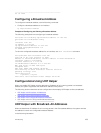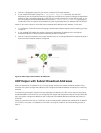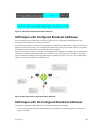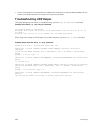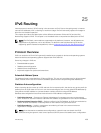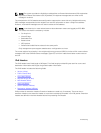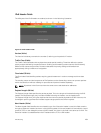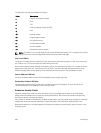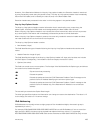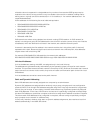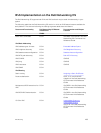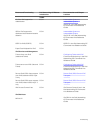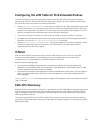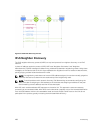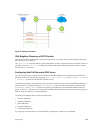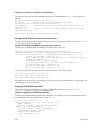However, if the Destination Address is a Hop-by-Hop options header, the Extension header is examined
by every forwarding router along the packet’s route. The Hop-by-Hop options header must immediately
follow the IPv6 header, and is noted by the value 0 (zero) in the Next Header field.
Extension headers are processed in the order in which they appear in the packet header.
Hop-by-Hop Options Header
The Hop-by-Hop options header contains information that is examined by every router along the
packet’s path. It follows the IPv6 header and is designated by the Next Header value 0 (zero).
When a Hop-by-Hop Options header is not included, the router knows that it does not have to process
any router specific information and immediately processes the packet to its final destination.
When a Hop-by-Hop Options header is present, the router only needs this extension header and does
not need to take the time to view further into the packet.
The Hop-by-Hop Options header contains:
• Next Header (1 byte)
This field identifies the type of header following the Hop-by-Hop Options header and uses the same
values.
• Header Extension Length (1 byte)
This field identifies the length of the Hop-by-Hop Options header in 8-byte units, but does not include
the first 8 bytes. Consequently, if the header is less than 8 bytes, the value is 0 (zero).
• Options (size varies)
This field can contain one or more options. The first byte if the field identifies the Option type, and directs
the router how to handle the option.
00 Skip and continue processing.
01 Discard the packet.
10 Discard the packet and send an ICMP Parameter Problem Code 2 message to the
packet’s Source IP Address identifying the unknown option type.
11 Discard the packet and send an ICMP Parameter Problem, Code 2 message to the
packet’s Source IP Address only if the Destination IP Address is not a multicast
address.
The second byte contains the Option Data Length.
The third byte specifies whether the information can change en route to the destination. The value is 1 if
it can change; the value is 0 if it cannot change.
IPv6 Addressing
IPv6 addresses are normally written as eight groups of four hexadecimal digits, where each group is
separated by a colon (:).
For example, 2001:0db8:0000:0000:0000:0000:1428:57ab is a valid IPv6 address. If one or more four-
digit group(s) is 0000, the zeros may be omitted and replaced with two colons(::). For example,
2001:0db8:0000:0000:0000:0000:1428:57ab can be shortened to 2001:0db8::1428:57ab. Only one set
IPv6 Routing
463



